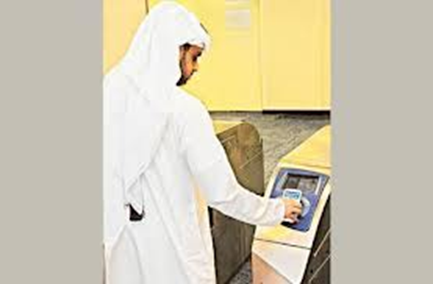By tomorrow, millions of Dubai’s public transport users will be able to pay for their trips simply by using their smartphones — but not if you have an iPhone.
The Roads and Transport Authority (RTA) announced the launch of its ‘Smart Nol’ service on Friday, a tie-up with etisalat and du that will also enable users to top up their Nol credit and check their balance.
RTA Corporate Technical Support Services CEO Abdulla Ali Al Madani said the mobile system only worked on phones with Near Field Communication (NFC) technology — but should be able to be used for other small payments in the future.
“We are providing this service for NFC-enabled mobile phone users via a special SIM card to use Nol services for public transport and in future for micropayments in (the) UAE. Customers will have a similar experience to Nol cards and there is no major change in using it. Currently we have more than six million Nol cards and we are expecting good (adoption) from our customer base since (the) UAE has a good number of NFC-enabled handsets.”
The NFC is similar to Bluetooth technology — though more streamlined. The Smart Nol will work by users placing their smart phones against the card readers at metro station gates or onboard buses and water buses.
The SIM cards will be available at etisalat and Du business centers from tomorrow.
Etisalat chief marketing officer Khaled El Khouly said in a statement the new technology would revolutionize travel.
“The launch of the latest NFC technology solution will be the beginning of a new era on how we empower our customers, as well as service providers in the country.”
Du chief commercial officer Fahad Al Hassawi said Du’s role went beyond providing telecom services but “to be a catalyst for society’s advancement”, in line with the Smart Government initiative.
Jacky’s Electronics chief operating officer Ashish Panjabi said NFC technology was simpler to use than Bluetooth and allowed information to be transmitted simply by tapping two devices together.
“The issue is at the moment not everything is NFC-enabled…if you look at Apple, it’s got nothing NFC-enabled. With every new iPhone launch, we’re wondering whether it will be equipped with NFC, but I don’t think it will happen. I don’t think it’s something they believe in.”
Apple was such a “significant player in the market” which compromised the chances NFC technology would become commonplace.
More than 65 per cent of bus users in Sweden already use their mobile phones to pay for public transport, but there are other forms of technology than NFC such as the mobile barcode, which requires people to purchase barcodes which are sent to their phones, and the Google Wallet ‘tap-and-pay’ system already being used to pay for public transport in parts of America. Local company Beam are trialing a payment system using a mobile app which stores credit card details.
Panjabi said the pitfalls of the NFC system were that many parties were required to cooperate, including the credit card companies, local banks, telecommunication companies and merchants. Apple may have “something up their sleeve”, such as plans to create their own mobile payment system.
“Apple has got the largest repository of credit card data because hundreds of millions of people who have signed up with Apple have given credit card details, whether it be for music or games or devices…you would think (payment) would be something they could control and dominate through that material.”
However, he said most people who had purchased a mainstream smartphone such as Samsung, LG or BlackBerry in the past two years would likely have the technology. The RTA advised people to check with their mobile phone providers about whether their phones were compatible.
British consulting firm Juniper Research recently predicted mobile ticketing across all forms of transit would triple in the next five years, led by public transport — though it also said in markets where the iPhone was popular, such as North America and Western Europe, NFC technology would probably not take off.
Panjabi said there was “no limit” of where cellphones would go next.
“We’re looking now at the next step, which is wearable technology…we’ve seen the smart watch, Google Glass…that may eliminate cell phones one day.”



